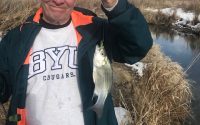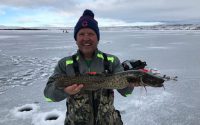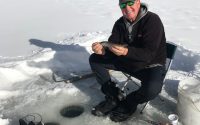June Sucker Scam
The latest business squarely in the sights of the June Sucker Recovery Implementation Program for possible extermination is the CLAS Ropes Course . Ben Allen operates a canoeing and river touring business on the lower Provo River as part of his leadership and team building exercises taught on the river’s edge in west Provo, Utah.
“We have provided people with the opportunity to canoe and to take sightseeing and educational tours along the lower Provo in conjunction with our ropes course for 18 years,” says Allen. “But, when the June Sucker Recovery people decided to change where the Provo River flows into Utah Lake, they told me I will soon be out business (at least as far as access to the Provo River is concerned). The water venues produce close to $100,000 dollars a year for our family.”
The June Sucker Recovery Implementation Program (JSRIP) recently held an Open House to describe in detail the plan to stop the flow of the Provo River and then to create an artificial delta that they hope will be provide better spawning habitat for the June sucker. It is estimated that the cost to taxpayers of the new project will top 20 million dollars just for starters. According to program documents the project could begin as soon as 2013.
This project follows the creation of the Hobble Creek Delta project, a three million dollar investment that, according to officials is seeing some success. One assessment reported finding eight juvenile suckers using the newly built delta. Wow! Three million dollars spent for eight suckers that successfully negotiated their way passed the hundreds of waiting pelicans, cormorants, and grebes to end up being discovered by members of the June sucker recovery team. Needless to say, questions still remain as to the long-term potential of the Hobble Creek Delta since too few suckers are currently using the area to accurately predict future success.
The controversial June Sucker Recovery Program has been a disaster from the very beginning. I once attended a meeting in which the chief biologist working on the project reported that the “true reason the sucker couldn’t be recovered is that there are 49 million carp in the 26 mile long lake and they are destroying the natural habitat.” Upon closer inspection of their method for determining the “nasty” carp population, they were forced to lower their estimates to around 7 million carp. Incidents like these and the shear insanity of saving a fish species that no one recognizes, few in any people have ever encountered, and in all reality is a fairly recent hybrid species — not even a true, native, June sucker, leaves people scratching their heads in wonderment of our government’s mandate to “save such fish” to the tune of hundreds of millions of taxpayer dollars.
To add insult to injury, the chances of successfully recovering the June sucker is a stunning one percent. That’s correct; our government will potentially spend hundreds of millions of dollars with a ONE percent chance of success. Citing a “Memorandum To Interested Parties” published first by the Budd-Falen Law Firm in Cheyenne, Wyoming, and written by Karen Budd Falen: “As of May, 2010, there are [have been] 1374 species listed as threatened or endangered … and only 21 have been recovered.” Since its publication, close to 400 additional species are in the process of being listed at a per-species cost (just to be listed) of between $500,000 and 750,000 dollars.
In a nutshell, the proposed Provo River Delta project will seriously damage at least one business on the lower Provo River, damage or destroy parts of several long-standing farms, disrupt the existing river flow and possibly destroy the public’s ability to fish one of the most popular sections of the river, and will permanently alter crucial spawning habitat for walleyes, white bass, largemouth bass, crappies, and bluegills all in the name of preserving a hybridized “trash fish “.
Ben Allen of CLAS Ropes Course simply wants to continue to operate his business through a very tough economy. “I don’t believe it’s wrong to try to save a species. And, I’m sure there are those who have some great ideas on how to do that. But at what cost do we proceed? How can our government continue to spend money like a drunken sailor on projects such as the Provo River Delta that have never been proven to be successful while destroying people’s economic lives in the process?” Great question Ben.
To learn more about this boondoggle, email me at don@donallphin.com
June Sucker Recovery – A New Threat To Business
Benjamin Allen, the well respected owner of the CLAS Ropes Course, is the latest business squarely in the sights of the June Sucker Recovery Implementation Program. Allen operates a canoeing and river touring business on the lower Provo River as part of his leadership and team building exercises taught on his ropes course located on West Center Street.
“We have provided people with the opportunity to canoe and to take sightseeing and educational tours along the lower Provo in conjunction with our ropes course for 18 years,” says Allen. “But, when the June Sucker Recovery people decided to change where the Provo River flows into Utah Lake, they told me I will soon be out business (at least as far as access to the Provo River is concerned). That portion of our business produces close to $100,000 dollars a year for our family.”
The June Sucker Recovery Implementation Program (JSRIP) recently held an Open House to describe in detail the plan to stop the flow of the Provo River very near the recently-completed Lakeshore Drive Bridge, and then to create an artificial delta that their biologists believe will be provide better spawning habitat for the June sucker. It is estimated that the cost to taxpayers of the new project will top 20 million dollars. According to program documents the project could begin as soon as 2013.
This follows the creation of the Hobble Creek Delta project, a three million dollar investment that, according to officials is seeing some limited success. One assessment I saw recently reported finding eight juvenile suckers using the newly built delta. Questions still remain as to the long-term potential of the Hobble Creek Delta since too few suckers are currently using the area to accurately predict future success.
The controversial June Sucker Recovery Program has never received positive public support since few could understand why the government is committed (by law) to preserve, in this case, a (hybridized) non-game fish species at a potential cost over time of hundreds of millions of taxpayer dollars.
To add insult to injury, the chances of successfully recovering the June sucker is a stunning one percent. That’s correct; our government will potentially spend hundreds of millions of dollars with a ONE percent chance of success. Citing a “Memorandum To Interested Parties” published first by the Budd-Falen Law Firm in Cheyenne, Wyoming, and written by Karen Budd Falen: “As of May, 2010, there are [have been] 1374 species listed as threatened or endangered … and only 21 have been recovered.” Since its publication, close to 300 additional species are in the process of being listed at a per-species cost (just to be listed) of close to $750,000 dollars.
In a nutshell, the current Provo River Delta project will seriously damage at least one business on the lower Provo River, destroy parts of several long-standing farms, disrupt the existing river flow and thus alter and possibly destroy the public’s ability to fish one of the most popular sections of the river, and will permanently alter crucial spawning habitat for walleyes, white bass, largemouth bass, crappies, and bluegills, all in the name of preserving the June sucker.
Benjamin Allen of CLAS Ropes Course simply wants to continue to operate his business through a very tough economy. “I don’t believe it’s wrong to try to save a species. And, I’m sure there are those who have some great ideas on how to do that. But at what cost do we proceed? How can our government continue to spend money like a drunken sailor on projects such as the Provo River Delta that have never been proven to be successful while destroying people’s economic lives in the process?”
For more information on the Provo River Delta Project email me at: don@donallphin.com and I’ll send you the links to the appropriate websites.










